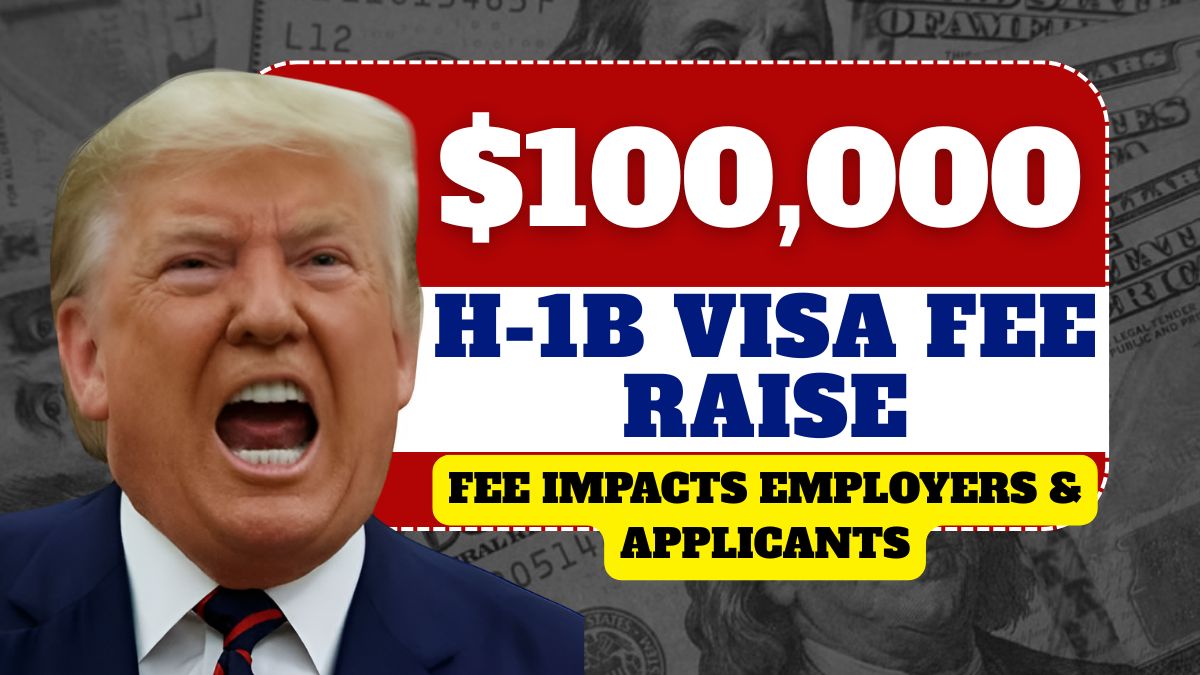Former US President Donald Trump has signed a new executive order, under which applicants for H-1B visas will now have to pay a hefty fee of $100,000 (approximately ₹8.8 million) annually. This decision will directly affect foreign professionals who want to work in major US tech companies.
What is the H-1B Visa?
The H-1B visa is a non-renewable employment permit introduced in the US in 1990. Its main purpose was to bring in foreign talent to work in sectors where skilled American workers were limited.
- It is meant for individuals with specialized skills in engineering, technology, science, or mathematics.
- The visa is initially valid for 3 years, extendable up to 6 years.
- Many H-1B holders later apply for a Green Card (Permanent Residency).
Previous Fees vs. New Fee
- Earlier Fee: Around $1,500.
- New Fee (Trump’s Order): $100,000 annually.
👉 Over six years, an employee would need to pay $600,000 (over ₹5 crore).
This is a drastic increase, making it much more expensive for companies to hire foreign talent.
Why H-1B Visa Fee Raise 2025
According to Trump, the H-1B system was being abused.
- He claims that American workers were losing jobs because companies were hiring cheaper foreign workers.
- Firms must now consider whether paying $100,000 annually per worker is worth it.
- White House Staff Secretary Will Scharf called H-1B “one of the most abused visa systems.”
Both Opposition and Support
The H-1B visa has always been controversial:
- Opponents argue it limits opportunities for Americans and reduces wages.
- Supporters believe it allows the US to access top global talent.
Big business leaders, including Elon Musk (Tesla, SpaceX), argue that America cannot remain globally competitive without the world’s best professionals.
Who Will Be Most Impacted?
The US tech giants rely heavily on H-1B workers:
- Amazon received the most H-1B visas last year.
- Other major companies include Tata Consultancy Services, Microsoft, Google, Meta (Facebook), and Apple.
Now, with higher fees:
- Companies will be forced to reconsider hiring foreign workers.
- Amazon even issued a warning to its employees, advising H-1B holders outside the US to return immediately.
The Biggest Impact on Indians
- 71% of H-1B visas go to Indians.
- China is second with only 11.7%.
For Indian engineers, IT professionals, and software developers, the US has always been a dream destination due to high salaries, better lifestyle, and global exposure.
👉 But with the new fee, many small and medium-sized US firms will not be able to afford Indian talent.
👉 This could crush the dreams of thousands of young Indians.
Experts’ Opinions
- Tahmina Watson (Seattle immigration lawyer): “This could be the final blow to many small businesses and startups. Most small businesses will not be able to pay such a high amount.”
- George Lopez (Analyst): “Such an expensive fee will undermine America’s competitive edge in technology.”
Gold Card Scheme
Alongside the H-1B changes, Trump announced a Gold Card Visa Scheme:
- Fee: $1 million (₹7.4 crore) per individual or $2 million (₹14.8 crore) for companies.
- Purpose: To attract the wealthiest and most successful individuals.
- Government claims it will generate billions for tax cuts and debt repayment.
👉 Critics argue this will make the US a country only for the rich, leaving out talented but less wealthy individuals.
American Politics and the H-1B
Trump has long maintained a mixed stance:
- On one hand, he says American jobs must be protected.
- On the other, he admits the US still needs foreign talent.
- During his 2016 campaign, he even suggested granting green cards directly to graduates to retain talent.
Conclusion
Trump’s new order presents a huge challenge for H-1B visa holders.
- Large tech companies may still manage the fees.
- Small and mid-level firms will struggle, forcing them to expand in countries like India, Canada, or Europe instead of the US.
For Indians, who are the largest H-1B applicants, this order could mean that the American dream becomes even more distant and expensive.
